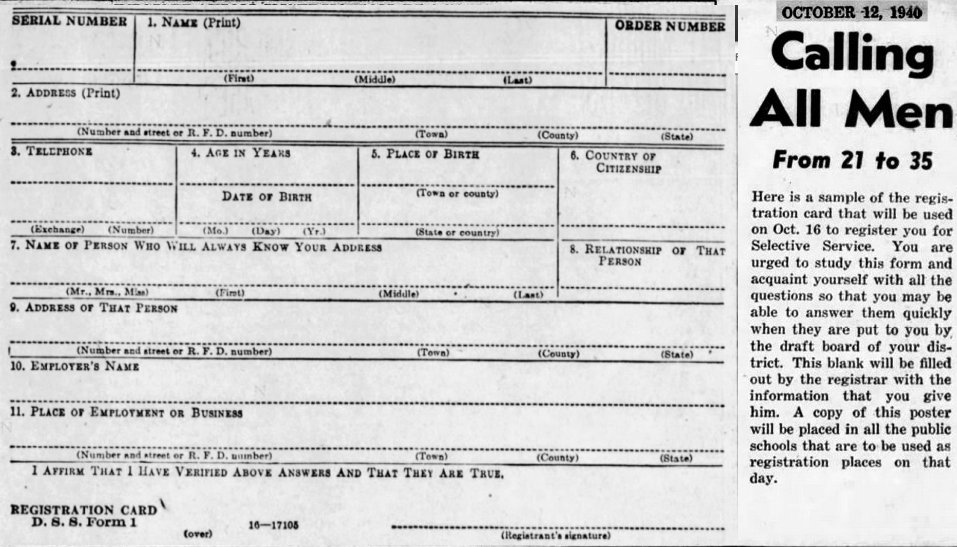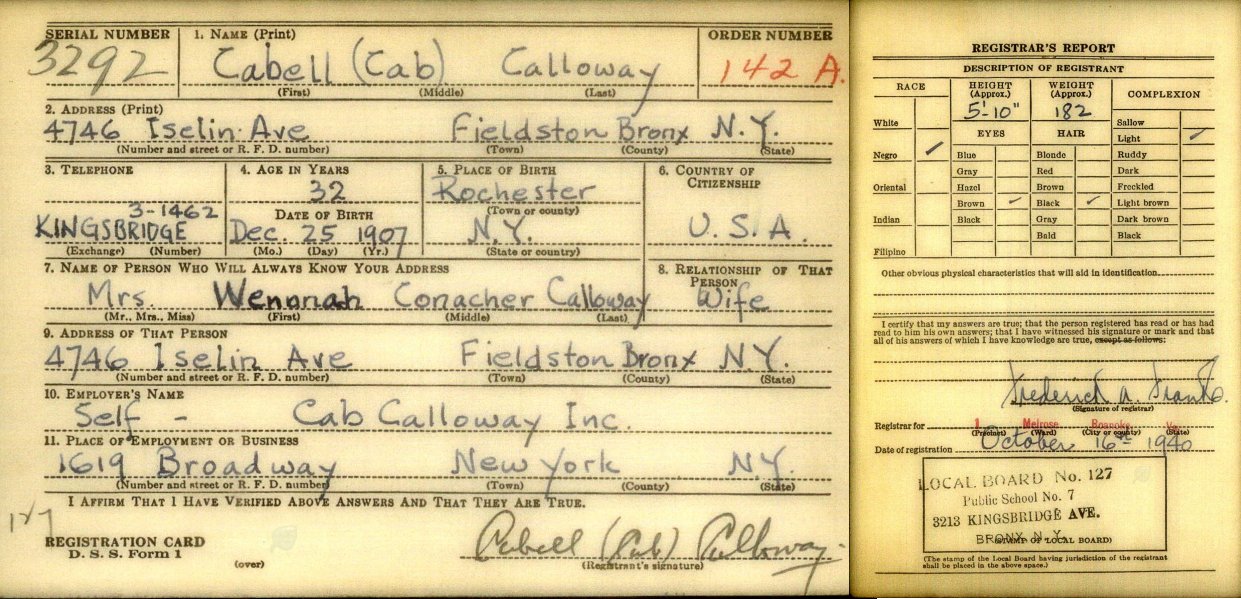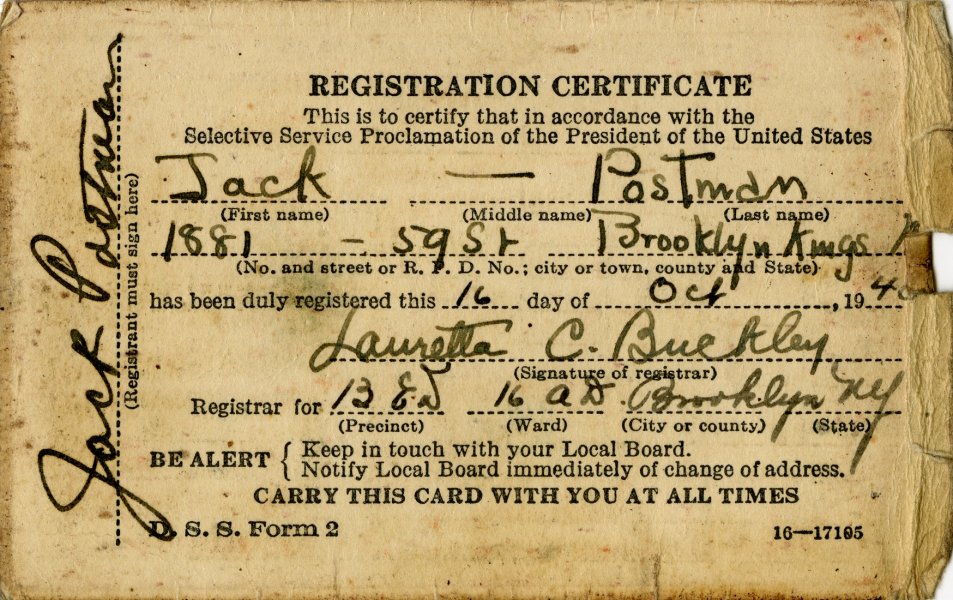
World War 2 Draft Registration
© 2021 by Marv Goldberg

In the course of researching my articles, I often use singers' World War 2 draft registration data as a guide to documenting their off-stage lives. Since I found the whole process fascinating, I thought I'd share it with you.
Over 80 years ago, things were looking grim. Fascism had rolled over Europe, with Paris falling to the Nazis on June 14, 1940. As much as America wanted to remain neutral, we knew it was only a matter of time until we were sucked into the war.
But who was going to fight for us? After World War 1, we demobilized most of our troops and our peacetime army was woefully unprepared to join a new war. In 1940, the U.S. Army had around 270,000 soldiers, the Navy had around 161,000 sailors, and the Marine Corps' strength was about 28,000.
Over the summer of 1940, the Roosevelt administration pushed for a peacetime draft in order to build up our armed forces. This required American men, 16 million of them, to register.
Before we look at that, let's take a trip down a different memory lane and look at draft registration in World War 1. On April 4, 1917, the United States declared war on Germany. However, at the time, the army had fewer than 135,000 soldiers. Something had to be done. We needed a draft and a draft needed registration.
President Woodrow Wilson declared June 5, 1917 as Registration Day for all men between 21 and 30. Just as an example, more Brooklynites registered that day (203,000) than there were soldiers in the army. The July 28 Brooklyn Eagle had a large article devoted to Registration Day. One thing it pointed out was that, after watching the war from afar for three years, patriotism ran high. The streets were decorated, marching bands made noise in neighborhoods, and politicians made speeches. I remember reading once that you received a small pin that said you'd registered. Many bars refused to serve anyone who didn't sport that pin.
Retracing our steps to the more relevant memory lane, the first mention of a Registration Day for World War 2 appeared in September 17, 1940 newspapers: it was to be on October 16. On that date (declared a national holiday) all males from 21 through 35, inclusive, had to register. All dates from here on are in 1940.
Note that I only looked in New York State newspapers for these details, but the articles would have been the same all over the country.
Generally, you went to the place at which you regularly voted, although this would vary by city or town. Very large cities had to add extra locations, such as schools, armories, and social halls.
Of course, it all had to be glamorized. In that September 17 article (mine was in the Poughkeepsie Eagle-News), President Roosevelt was quoted as saying:
In the military service, they will be intelligently led, comfortably clothed, well fed, and adequately armed and equipped for basic training. By the time they get physically hardened, mentally disciplined and properly trained in fundamentals, the flow of critical munitions from factory to combat units will meet the full requirements for their advanced training. [Wonder which country's army he was talking about.]
The real joy of Wednesday, October 16 was that it became a school holiday; the little juvenile delinquents had a day all to themselves. But not the teachers. They were pressed into service as clerical assistants, to help with the registration process, in the schools that were used as registration centers.
On September 27, the draft hit home as a necessary evil because, on that day, Germany, Italy, and Japan announced their alliance.
But what if you didn't speak English? How could you register? Not to worry. The New York Daily News reported on September 28 that New York City was going to employ 1000 translators for "R-Day". It said:
Col. McDermott [director of the Selective Service Administration] pointed out that foreign language groups, of which there are 33 ranging from Croatian to Yiddish, comprise 62 per cent of the population in a city where 1,107,000 are between 21 and 36, the draft ages.
... the meaning of the draft has been explained in the foreign language press, consisting of about 52 publications, and over 10 radio stations broadcasting daily in alien tongues.
Then, the rules started to come out. For example, the Elmira, New York Star-Gazette printed these on October 1:
Special registrars will be appointed by the Board of Elections to take the registration of persons confined to hospitals on the day of registration.
If a man is away from home on registration day, he must report to the most convenient place of registration in the community where he is on that day, and register and receive a certificate of registration. His registration card will be mailed by the Board of Elections to his local board.
Inmates of penal institutions will be registered by the superintendant or warden on the day of their discharge. [This only sounds like a joke, but inmates on death row were specifically exempt from registration.]
When the local boards were set up, they only used men over the draft age limit (that is, 36 and up). Women were also used as registrars, but I don't know if there were any specific rules for them. All served without pay.
The October 4 Binghamton Press And Sun-Bulletin talked about the five compulsory classes being held for those responsible for registering the 23,000 men in Broome County. They'd be shown how to fill out forms, blanks, and certificates.
The October 8 Brooklyn Daily Eagle answered a couple of questions:
Q. My working hours are such that I can't get to the registration board on Oct. 16. What do I do?
A. If your employer prevents your getting there on that day, he is obstructing selective service and subject to penalties under the law. In most cases registration day will be a holiday and persons who have to work on holidays will be given time off to register.
Q. Suppose I refuse to answer the questions put to me by the registrar.
A. The registrars already have instructions how to handle you. Recalcitrants will be urged and argued with, but, if they persist, witnesses will be called and the case referred to the United States District Attorney. For willfully obstructing the draft, a man is subject to the same penalty as for willfully dodging the draft: not more than five years in the penitentiary, nor more than $10,000 fine.
Q. I am subject to selective service registration, but at present am in a reformatory. Will I get in more trouble if I do not register?
A. Not unless you fail to register on the date of expiration of your sentence. This ruling also applies to persons in insane asylums, jails, and penitentiaries. Such persons will be registered "on the day of discharge" by the superintendent or warden of the institution and your responsibility from then on is to your local registration board in the voting precinct in which you formerly had residence.
What about "outsiders"? According to the October 9 Brooklyn Daily Eagle:
Members of the Communist party and the German-American Bund will be accepted into the United States Army on the same footing as members of any political group if certified for military service by the Selective Draft boards, according to an official announcement.
Men with first citizenship papers will be accepted through Selective Service, although the Army does not accept them as volunteers. Aliens who have not taken out first papers will not be certified and therefore will not be taken by the Army, it was announced. ["First papers" declared your intention to become a citizen.]
It's unclear to me, from the above, whether aliens who haven't yet taken out first papers would have to register, but I think they did.
What if you're away from home? We turn to the October 9 Middletown Times Herald:
The commissioners of Election noted several special cases of registration. They include:
Absentees who may be away from home on business or in college or training camp, may register at the nearest registration office. In some instances the institutions may arrange special registration boards of their own.
Sick persons not in hospitals may have another person apply to the chief registrar to be deputized to make out the card and registrar's report. Persons sick in hospitals will be served by registrars appointed by the Election Board.
Persons living on an Army, Navy or Marine Corps reservation, as West Point, or on a forest reserve, must register at the nearest convenient place of registration.
Persons at sea and abroad shall register within five days of their return to the continent by presenting themselves to a local board.
Enrollees in Civilian Conservation Corps will be registered by their company commanders or by other competent members of the company as registrars.
Any persons failing to register for any reason on the proper day may present himself before any local board. The board with register him and if his reason was valid will give him a certificate.
And what if you'd already been in the Army? There were more rules. If a man had served three or more consecutive years in the Army and had received an honorable discharge, he still had to register, but was exempt from the draft. The same applied to anyone who'd served six or more consecutive years in the National Guard.
You didn't have to register if you were a current member of the Army, Navy, Marines (or their reserves), Coast Guard, Coast & Geodetic Survey, Public Health Service, National Guard, a cadet at West Point, a cadet in the Coast Guard Academy, a midshipman in the Naval Academy, or a diplomatic representative.
How about if you were a native of the Philippines who was currently in the U.S.? In that case, no one knew the answer. They were classified as neither citizens nor aliens.
Papers began printing the form to be filled out on October 12, so that people could become familiar with the questions. They estimated that it would take between 13 and 20 minutes per man. The registrar would ask the questions and write down the answers. The form would then be given to the registrant to check and sign.
Here's the blank form:

Lately, I've been asking myself how you proved who you said you were and when you were born, or even if you had to. Did they really take your word for everything? Did you have to show a birth certificate? It wasn't mentioned in any of the instructions that were in the papers in the weeks leading up to October 16.
The back of the form had the registrar's best guesses as to the height and weight of the registrant, as well as a list of "obvious physical characteristics" (scars, tattoos, etc.). The registrar would then sign it, date it, and stamp it. I'm sure they asked height and weight; these would be difficult to estimate, especially if the man were sitting.
And here's one filled out. I selected someone you'd know:

If you subsequently moved (as Cab Calloway would each time he appeared somewhere else for any length of time), you were supposed to inform the draft board, which would then cross out your address and insert the new one. Since there was no allotted space to write in other addresses, some of these cards could get very messy. Note that the Serial Number and Order Number fields were filled in by subsequent processes.
And what did you get for all this effort? As soon as the Registration Card had been filled out and signed, the registrar used the data to prepare a "Registration Certificate" to hand to the registrant. This proved where and when you'd been registered. You were supposed to carry it with you at all times and could be asked for it by the police or other authorities (as Billy Williams was in the Charioteers' version of "Open The Door, Richard").

The back of that form had the same data as the back of the Registration Card.
The October 14 Binghamton Press And Sun-Bulletin detailed what "John Jones" could expect when he showed up on October 16:
He reports to the polling place of his district which is Alexander Hamilton school at 15 St. John avenue.
He finds four desks in the polling place, each manned by a registrant - an election inspector volunteering for the conscription registration. If he's early, he sits before one of the desks; if late, he gets in line.
In any case, eventually John is seated at a registration table, facing a registrar. Before the registrar is a card from which he reads questions that John Jones answers. These are:
1. Name. (John Jones gives first, middle and last name, spelling out each.) [No proof of name was required, but men were advised to give actual names and not nicknames.]
2. Address. (John Jones tells where he lives; if he is living on park benches [not a joke the Great Depression was still going strong], he gives an address where mail will reach him quickly.)
3. Telephone. (If he has no telephone, he gives a number at which he can be easily reached.)
4. Age In Years. (As of last birthday.) [I found a blurb in the October 8, 1940 Sacramento Bee that said no proof of age would be required at the registration. This accounts for many discrepancies in ages.]
5. Place Of Birth. (City, county, state, and country; if John Jones was born in a country that has since disappeared, such as Poland, he gives the name as it was at the time of his birth.)
6. Country Of Citizenship. (He answers "U.S.A." or the name of whatever the country may be; if he has taken out first papers only, he gives the name of the country from which he is transferring citizenship. If he has an alien registration card, he gives its number.)
7. Name Of Person Who Will Always Know Your Address. (This should be the person who can find John Jones quickest.)
8. Relationship Of That Person. (Wife, mother, employer, friend.)
9. Address Of That Person.
10. Employer's Name. (The company, not the foreman. If jobless, John Jones answers, "None".)
11. Place Of Employment Or Business. (Street number, etc.)
These are all the questions that John Jones answers. His replies are all spoken, the entering of them on the card being done by the registrar. When all have been entered, the registrar hands the card to John Jones who verifies each entry and signs his name at the bottom, under the statement: "I affirm that I have verified above answers and that they are true."
The registrar then turns the card over. On the reverse side he sets down his estimates of the weight and height of John Jones. He also makes check marks in a descriptive table under these headings:
Race: White, Negro, Oriental, Indian, Fillipino.
Eyes: Blue, gray, hazel, brown, black.
Hair: Blond, red, brown, black, gray, bald.
Complexion: Sallow, light, ruddy, dark, freckled, light brown, dark brown, black.
If John Jones has any other obvious physical characteristics that will aid in identification (a mole on his right cheek, a birthmark on the forehead), the registrar notes them down.
The registrar then fills in the certification space on the back of the card, which reads as follows:
"I certify that my answers are true; that the person registered has read or has had read to him his own answers; that I have witnessed his signature or mark and that all of his answers of which I have knowledge are true except as follows:"
If John Jones has said that he is 38 years old, whereas the registrar knows, from having known the family since John was born that he is only 28, he so notes.
That ends the process so far as the registration card is concerned. The next step is the filling in of a certificate of registration - a white card, 2 1/2 by 3/1/2 inches - that is John Jones's proof that he is not a draft dodger. He must carry it with him at all times. He will, on occasion, be asked to produce it.
Election Commissioners estimate that the whole process will take about 20 minutes a registrant.
[There was much more, but this one further paragraph is relevant:] WHO MUST REGISTER: All men who are 21 to 35 years old, inclusive, must register, no matter how many wives or children they have; no matter if they are blind, legless, or flatfooted; no matter if they are citizens or aliens; no matter if they are clergymen; no matter if they are conscientious objectors.
There was another long and complicated process that happened after this: serial numbers being assigned, drawing numbers for men to be drafted, filling out a long questionnaire if selected, etc. But that's beyond the scope of this article.
And it all worked. By 1941 there were 1,462,000 in the Army, 284,000 in the Navy, and 54,000 in the Marines. It kept building year after year until, in 1945, there were 8 times as many as that in uniform.
As I said, for singers of a certain age who end up in my articles, these cards can contain priceless information. And the process went on through 1946 (even after the war was over).
I hope you've found this as interesting as I have.